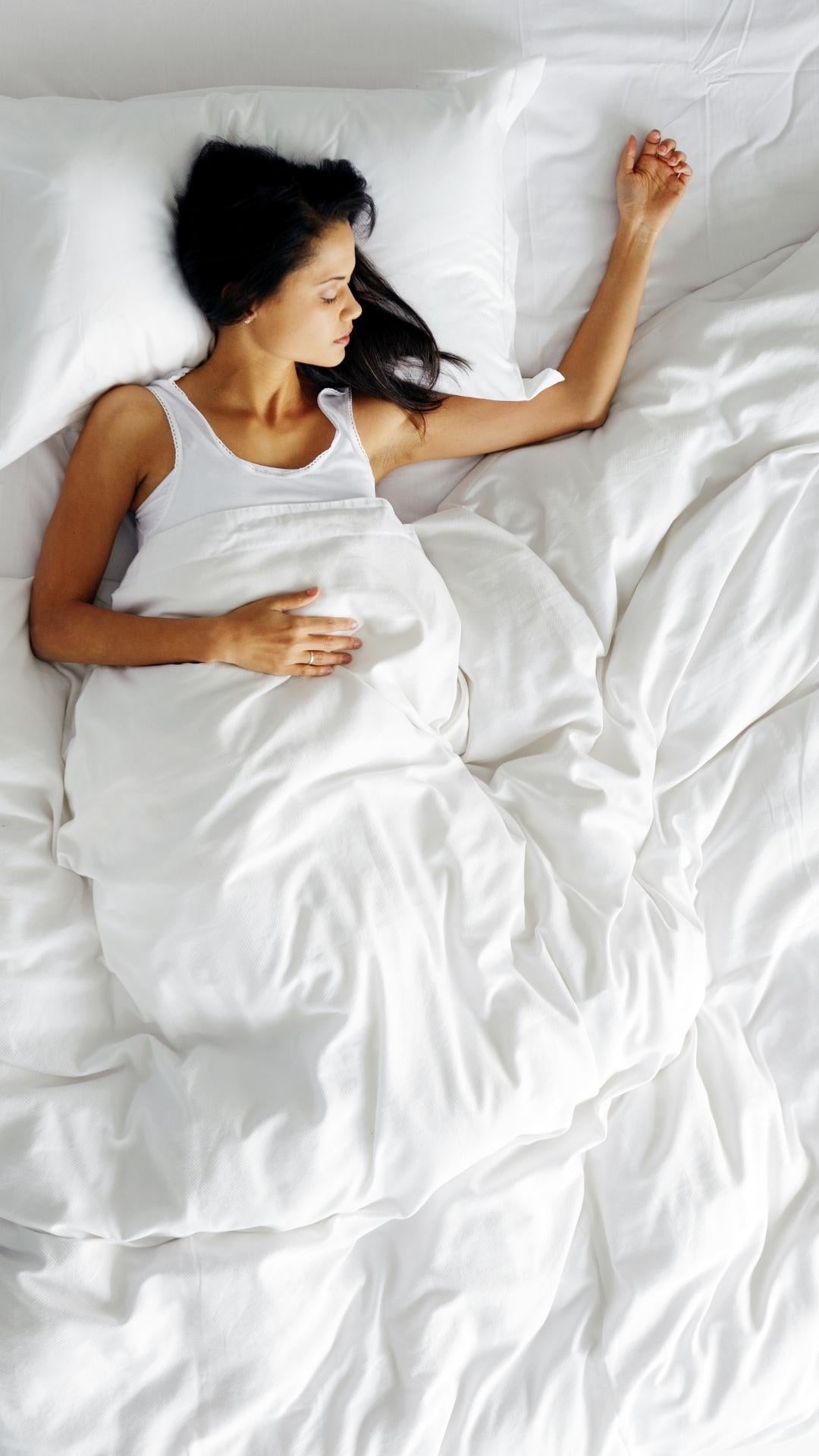
Is it possible to have a restful sleep?
Do you often get up in the morning without feeling well rested? You know, those mornings you want to throw your alarm clock out of your bedroom, pull the blanket over your head and fall into the best sleep ever?
There are many reasons why sleep is disturbed. Lifestyle is probably the most popular and disturbing cause. Stress, a bad diet, a bad night routine, too little exercise, etc. can all affect the quality of your sleep. Does that ring a bell?
Luckily, there is a way to regain the perfect night sleep! On the one hand, by understanding how your body and your sleep work. On the other hand, by taking back control through small daily changes.
Sleep : essential for optimal health
Sleep is of crucial importance, not only for our well-being and to function well the next day, but also to benefit from good health. Sleep plays a big role in our physical and psychological balance.
Lack of sleep, as we well know, leads to deficient energy, impatience and a rather crummy general state. But when bad nights become chronic, they risk causing an anxious or depressive state, impaired immunity, weight gain, less stress resistance, memory loss, difficulty concentrating, etc.
What happens while you sleep
A good night sleep is more than just closing your eyes and waking up seven or eight hours later. This is the easy part and over which we have control. But the real work all happens while we are in dreamland.
Once asleep, the body works hard to cleanse the brain using cerebrospinal fluid, this organic substance in which the brain is bathed. This cleaning allows the neurons to communicate with each other and to eliminate the toxins that the brain has accumulated during the waking period. It's also thanks to this cerebral work that the next day we can fully enjoy our cognitive faculties, such as concentrating and thinking.
In addition, it's during sleep that the liver, the hormonal and immune system come into action to participate each in their own way in a kind of reset of the body. In case of insomnia or during poor quality sleep, nocturnal biological processes cannot take place. At the beginning, we just feel badly, but if the chronicity sets in, then imbalance occurs.
The precious circadian rhythm
You may have already heard about the circadian rhythm. This is the 24-hour sleep-wake cycle that oversees wakefulness and sleep. This is what makes you start to yawn when darkness falls and open your eyes when the sun's rays sneak through the closed shutters. It's above all what launches absolutely the whole nocturnal process and ends it the next morning with perfect timing.
Although it is fundamental and innate, it is also very fragile. Without even knowing it, most of us compromise our circadian rhythm, and therefore our sleep, on a daily basis.
Understanding the sleep-wake cycle
The circadian rhythm is controlled by sunrise and sunset. It's light, we're awake. It's dark, we're asleep. It's simple, it makes sense and it's always been that way. However, by ignoring the signs that our body sends us, we tell it that its work is not necessary. For example, by turning on the lights everywhere to stay up late, we disrupt the rhythm. Gradually, the cycle becomes less and less efficient, just like our sleep.
The sleep-wake cycle is influenced by the sun and the moon, but is controlled by two major hormones, cortisol and melatonin.
Cortisol
Cortisol peaks in the morning. It's sort of the wake-up hormone. It makes us mentally and physically alert and makes us feel energized when we wake up. As the day progresses, it naturally descends to allow the body and mind to prepare for sleep.
Melatonin
Melatonin, on the other hand, is more of a sleep-inducing hormone. Its level rises in the evening, peaking in the middle of the night and falling as morning approaches.
Although the two hormones are antagonists, they work in perfect sync to orchestrate the sleep-wake cycle... at least when things are going well!
Why do we sleep so badly?
The question that so many people are asking! As mentioned at the beginning of the article, the answer is far from simple since so many reasons can apply and often, more than one at the same time.
One thing is certain though, poor sleep and a disturbed circadian rhythm prevent the normal development of all nocturnal physiological processes.
Let's start with stress!
In addition to being the wake-up hormone, cortisol is also a main hormone involved in stress reactions. Whether brief or chronic, stress leads to a rise in cortisol. You now know that the presence of cortisol prevents the action of melatonin. Without melatonin, it's hard to fall asleep and even harder to stay asleep all night.
Beyond the imbalanced physiological reactions, stress often forces us to be restless, eat poorly, let our brains get crowded with thoughts, have a few extra cups of coffee, etc. All of these actions also interfere with sleep.
What about screens ?
We are in an era where almost everything is virtual. Entertainment, information, shopping, communication with loved ones, etc. It's convenient, of course, but it can also become harmful. You've surely heard this rule that says to turn off all screens one to two hours before bedtime? While relaxing in front of your screen may feel calm to you, your nervous system sees it differently.
The light projected from the screen tells your body that it is not yet time to release melatonin, as if the sun had not yet set. Even at the lowest intensity, even veiling the blue light, the body thinks it's still daytime.
As it's now midnight (maybe even later) and your eyes are glued to your screen, cortisol is flowing! Then you decide it's time to go to bed. Screen is closed but eyes are wide open. Impossible to sleep, you have just played a dirty trick on your body! After a few hours of very unrefreshing sleep, you get up the next morning in very bad shape.
A few more reasons not to sleep...
Stress and screens are two factors that greatly influence the quality of sleep. As modern as they are, they have managed to climb the ladder to place themselves at the top of the list of disturbing effects. But there are others!
- age and hormones
- poor diet
- addiction to stimulants or taking a stimulant too close to bedtime
- chronic inflammation
- night job
- a lack of physical exercise or practicing a sport too close to bedtime
Sleep well all night long
There are three ways to sleep poorly. You don't fall asleep, you wake up in the middle of the night or you sleep without feeling refueled the next day. The first two should ideally be addressed differently. If you succeed, the third one should get fixed simultaneously.
To fall asleep
To fall asleep, you must first be calm and ready to sleep. Indulging in a relaxing evening routine is a great solution. By practicing it every night, your body will know that it will soon be time to sleep, so it will prepare itself more effectively. Try to go to bed always at the same time and when drowsiness starts to tickle you, go to sleep without delay.
Natural products can also help you achieve this state of pre-sleep calm. GABA, 5-HTP and fast-release melatonin are some of the most popular and effective.
Also, a late night herbal tea should be considered. The hot liquid will soothe your body and the choice of herbs will bring deep relaxation. try passionflower, lemon balm or valerian for your next infusion.
To stay asleep
You fell asleep, yeh! Now, you have to stay asleep. If you've managed to relax before going to bed, your stress and incessant thoughts shouldn't drag you out of your dreams.
To make sure, you can try slow-release melatonin. This natural product helps curb the hasty rise in cortisol and keeps you asleep until morning.
L-Theanine is also a natural product recommended to prevent nocturnal awakenings. Its action helps keep the brain in a state of deep relaxation.
It's time to go to sleep!
Remember, starting with a good late-night routine will help your quality of sleep. But it's also your daily lifestyle choices that will determine your long-term success. The combination of the two will allow you to benefit from a restful sleep, but also from an optimal quality of life.
To get there faster and more efficiently, natural products adapted to your needs could greatly help you. Contact one of our naturopaths to choose them well.
Consult your healthcare professional before taking any natural products, especially if you have any medical conditions or are taking medication.
Articles on the same subject
While very entertaining, our screens have unfortunately become harmful to our health. Find out how to reduce these effects in this article.
Lack of energy has, unfortunately, become a modern health condition. To find out how to make your habits promote energy, read this.

2 comments
Merci pour votre commentaire ! Le compliment sera transmis à l’équipe de rédaction sans faute !
J’ai rarement lu un article aussi intéressant, facile à comprendre, rédigé d’une façon qui nous invite à poursuivre la lecture jusqu’au bout sans se sentir coupable de quoique ce soit, comme si tous ces trucs sont réalisables et accessibles. Les informations présentées pour qu’elles puissent être comprises par tous: GÉNIAL!
Merci pour cet EXCELLENT article!